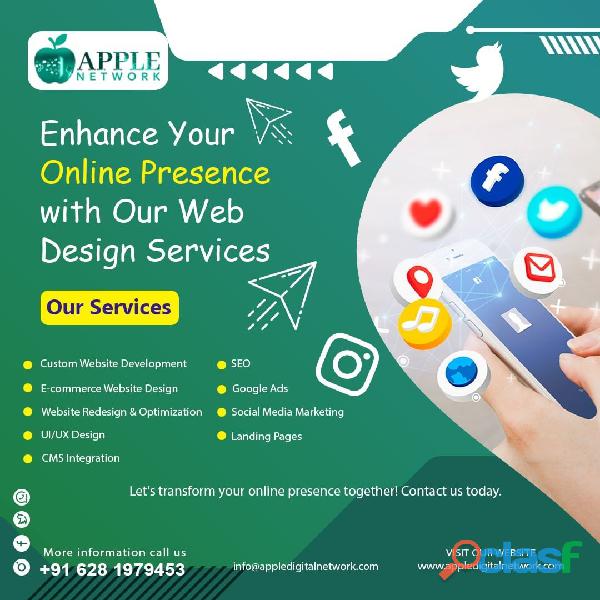Services
Top sales list Services

Ahmadpur East (Punjab)
Car rental and van rental worldwide. Discover very exciting offers and book online to save money with our convenient and hassle free booking. Find out more! https://www.rafaycars.com/
See product

Pakistan (All cities)
Struggling with Discrete Mathematics? Get expert assistance from BookMyEssay! Our professional tutors provide detailed, step-by-step solutions tailored to your needs. Achieve higher grades and deepen your understanding effortlessly. Don't let complex problems hold you back—book your session today and excel in your assignments! Visit: www.bookmyessay.com.au/subject/discrete-mathematics-assignment-help Contact Details: Contact- +1(240)8399485 Telegram link BookMyEssay - https://t.me/Bookmyessays Whatsapp number UK +447441449560 Whatsapp number Australia - +61480048370
See product

Pakistan (All cities)
As the best digital marketing company in India, we are dedicated to helping your website reach new heights! At our Online Digital Marketing Agency in India, we offer creative and effective solutions designed to make your brand shine. Here’s how we can help: Effective Social Media Management: Build your online presence with expert social media strategies. Innovative Marketing Campaigns: Unique strategies to captivate your audience and stand out online. Comprehensive Analytics: Track performance and get insights to keep your marketing efforts on track. Let us help you attract more visitors, boost your online presence, and achieve your business objectives. Ready to transform your online presence? Contact us today and let’s start building your success story. For more visit us : https://sapttechlabs.com/digital-marketing-agency-in-india/
See product

Pakistan (All cities)
We provide the best Website Design services in Hyderabad, India. Our goal is to utilize the newest technologies to develop websites that are efficient and modern. Since mobile devices represent the majority of traffic in the modern digital world, we realize how important it is to stay updated. The goal of our project is to transform your website into an effective marketing tool that engages your audience and accelerates the expansion of your company. We are the best Website Design company in Hyderabad, with a focus on making amazing websites that meet your unique requirements. You have confidence in Apple Digital Network to provide you with an excellent web presence that is customized to meet your business goals.
Free
See product

Lahore (Punjab)
Campany need female accounted lahore Send C.V 03334470538 yes -- OK for recruiters to contact this job advertiser. yes -- Phone calls about this job are ok. Yes – This message may be reposted elsewhere.
See product

Karachi (Sindh)
WAVES SERVICES CENTER IN KARACI 24/7 Air Condition Deep Freezer Repair Services 24/7 IN All Over The Karachi Contact: WAVES SERVICES CENTER 03322499859 Experianced Technicians For All Types Of Repairs
See product

Karachi (Sindh)
Easy Life Services Deals In All Types Of Secuirty and Surveillance Items Installation and Maintenance some of them are listed below like Cctv Cameras Installation Walkthrough Gates Electronic Barriers Road Blockers Tyre Killer Pabx Systems Access Control System and many more For More Details Contact Us Email easylifeservicespak@gmail.com
Rs 20.000
See product

Karachi (Sindh)
Whether it is Birthday party, Mehndi ceremony, Mayoon ceremony, weeding ceremony, valima ceremony, Mehfil-e-Milad, Majlis or any kind of gathering we serve the following which fulfill the requirement of economy budget. We have a factory for inside preparation of all such items, our kitchen equipped with all necessary kitchen appliances. Please note our special recipe delicious items as follow. • Halwa, Puri,Paratha, Kachori and Dahi Bondi specially designed for low budget customers. • BBQ TIKKA:Chicken BBQ Tikka with various variety such as Balochi Tikka, Amercan Tikka, Malai tikka, Shahi Tikkka, Green tikka, Shahishatuc Tikka, Lebanoni tikka and Mexican Tikka etc. • BBQ KABAB: Like Tikka we have long range of Kabab such as Gola Kabab, Seikh Kabab, Behari Kabab, Chundan Kabab, Rashmi Kabab Dhaga Kabab, Turkish Kabab, Chicken Dhaga Kabab, and finally our most special recipe kabab fry which is done in butter. • BBQ BOTI: like tikka and kabab we have long range of bbq boti items like behari Boti, Malai Boti, Chicken Boti, lebnoni boti,shahi shatuck boti, stick boti, Afghani boti and Shinwari boti etc • BBQ FISH we also deals in bbq of fish like Magra fish bbq, Surmai fish bbq, breadcram fish bbq and paplaate fish bbq. SPECIAL INSTRUCTIONS Due to the Heavy work load and prior orders you are requested to place the order atleast 2 days ago so that we can manage your program in a proper way. Second if you are unaware with our taste we can serve you our sample of any specific item this offer is free of cost. PAYMENT Order payment details Half payment ------ before the order Remaining Half Payment ------at the time of order. ORDER DELIVERY Order will be served at your site, our neat and clean staff will prepare the dishes at your site with all necessary equipment and appliances Views: 4
See product

Lahore (Punjab)
Buy now from BBAmna online store where you can found variety of Pakistani Make Up products and you can also see tutorial regarding Beauty makeup from our youtube channels. Please don't forget to contact us at: 0304-1111080 or visit our website: Views: 3
See product

Islamabad (Islamabad Capital Territory)
Females required for the post of Assistant and Therapist in Islamabad. Attractive package offered yes -- OK for recruiters to contact this job advertiser. yes -- Phone calls about this job are ok. Yes – This message may be reposted elsewhere.
See product

Karachi (Sindh)
Looking to hire Real Estate Agent in Karachi Office send your Cv. yes -- OK for recruiters to contact this job advertiser. yes -- Phone calls about this job are ok. Yes – This message may be reposted elsewhere.
See product

Islamabad (Islamabad Capital Territory)
We are searching for specialized doctors in major fields, specifically general practitioner and gynecologist who can serve patients in Guberg Medical center, Islamabad. We are also accepting trained Nursing staff. Gulberg Medical Center is a new setup aiming to serve people with the best of health care services. Price will be discussed upon contact.
Rs 25.000
See product

Karachi (Sindh)
Required Teacher for following courses; 1)MS Office(2010,2013,2016,2018,2019); ?MS Word ?MS Excel ?MS PowerPoint 2)MS Access(2013,2016,2018); ?Complete MS Access 3)Web Design & Development; ?WordPress basic ?WordPress Advanced ?Php and MySQL ?HTML,CSS and Dot Net ?Wix 4)Android Development; ?UI/UX Android Development Apps etc 5)Graphics Design and Video Editing; ?Adobe Photoshop ?Adobe illustrator basic ?Adobe illustrator Advanced ?Coreldraw ?Adobe After Effects ?Adobe Premiere Pro ?Adobe LightRoom ?Sony Vegas Pro 11 & 13 ?Filmora 6)Networking and Voip PBX Course; ?CCNA (R&S) ?CCNA (Security) ?CCNP (R&S) ?CCNP (Security) ?Asterisk (Voip PBX) 7)Full Digital Marketing course; ?FACEBOOK,YOUTUBE and others 8)Architecture Course; ?AUTOCAD 9)Airline course; ?Galileo for flights booking,travel agency 10)Language Course; ?Arabian Language ?Chinese Language ?American Accent Language ?German Language ?Spanish Language ?British Accent Language If you have practical knowledge and some experience of any of these courses feel free to join us. Just send your details and CV at whatsapp Number given below: +923312501247 Aasan Coaching Institute Current Location: Gulshan Iqbal Block08,behind Urdu Science College,Karachi Pakistan. Views: 38
See product

Pakistan (All cities)
The StatusQ Music Video Maker application stands out as a versatile and powerful tool for creating high-quality music videos. Its user-friendly interface, extensive template library, and advanced editing tools make it an ideal choice for both beginners and experienced video creators. With features like real-time preview, high-quality export options, and seamless social media integration, StatusQ empowers users to produce engaging and visually stunning content. Whether for personal projects, social media content, or professional marketing campaigns, the StatusQ Music Video Maker application provides the perfect platform to bring creative visions to life.
Free
See product
4 photos

Lahore (Punjab)
Hi job needed for personal secretary. Demand one lac Contact 03017555406 with screenshot of this add.. yes -- OK for recruiters to contact this job advertiser. yes -- Phone calls about this job are ok. Yes – This message may be reposted elsewhere.
See product
-
Next →
